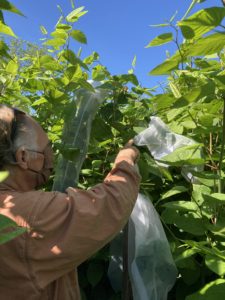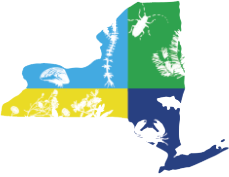
Japanese knotweeds (Reynoutria japonica, Reynoutria sachalinensis, and their hybrid Reynoutria X bohemica) are widespread and invasive, causing negative impacts on ecosystems and economies in the US, Canada, and Europe. This invader is extremely difficult to control, and managers seek environmentally friendly alternatives to annual herbicide treatments. Biological control (biocontrol) uses selected species from an invasive species’ native range to control the invasive species in its introduced range. When successful, this approach permanently suppresses the invader and is more targeted than chemical methods.
After extensive testing and review by federal agencies (USDA/APHIS), on March 20th, 2020, the Knotweed Psyllid (Aphalara itadori) was approved for release in the U.S. as the country’s first biocontrol agent for Japanese knotweed. This sap-sucking insect native to Japan was later released on June 10 (during NY Invasive Species Awareness Week) by Dr. Bernd Blossey and colleagues at Cornell University. A week after releasing the 2,000 A. itadori adults at two locations in New York’s Tioga and Broome counties, the researchers found the insects had successfully laid thousands of eggs. The releases in New York State are part of a nationwide effort with similar releases made in Rhode Island, Massachusetts, West Virginia, North Carolina, Oregon and Washington State.
The psyllid was previously released to manage knotweed in the UK and Canada, but in both countries failed to establish and build large enough populations to affect knotweed. The Blossey lab remains cautiously hopeful for success of A. itadori releases, however they will explore for additional safe but more effective biocontrol organisms in Japan and China. This work in NYS is led by Dr. Bernd Blossey (phone: 607-227-1572; email: bb22@cornell.edu) in collaboration with the NY Invasive Species Research Institute and funding from the the Environmental Protection Fund as administered by the New York State Department of Environmental Conservation..
Additional resources provided by NYISRI on Knotweed and Biological Control

